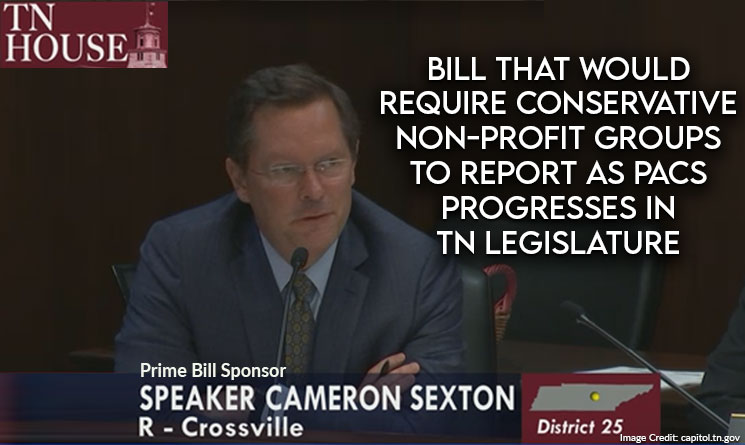Image Credit: capitol.tn.gov
The Tennessee Conservative [By Jason Vaughn] –
An amended version of a caption bill that seeks to have 501C4 non-profit groups report expenditures of $5000 or more made 60-days prior to an election has passed the House Local Government Committee and now moves on to the House Finance, Ways and Means Committee.
Since the publication of our articles on this legislation, many Conservatives have raised concerns that if this bill is meant to be about transparency, it is odd that the amendments that made the bill have never been made available to the public on the General Assembly website, that the amendments were sneaked into an obscure caption bill and that when votes have been taken in committees, they were done by voice vote – meaning the public will not know how each of the legislators voted on the legislation until the final votes are taken on the House and Senate floors.
Following some discussion and the presentation of the bill during the House Local Government Committee meeting yesterday, Chair John Crawford (R-Bristol/Kingsport-District 1) recognized Speaker Cameron Sexton (R-Crossville-District 25) who prompted the legal representative of the committee to outline the legal interpretation of the legislation.
Sexton said, “There’s a lot of information out there about what this bill would do and so I would like to have their interpretation on what this bill actually does and doesn’t do.”
Addressing legal, Sexton asked, “Does this bill at all limit any 501C4 activities, prohibit any communication, prohibit them from doing any issue advocacy at any point throughout the year and during an election?”
Matt Mundy, committee attorney, said, “This in no way prohibits, restricts or limits the ability of a 501C4 or any other entity from engaging in speech, advertising, mailers, commercials, anything like that. There is, in my personal view, nothing that chills free speech when it comes to 501C4’s. We only want them to report expenditures in excess of $5000 that were made within 60 days of an election. Other than that, they can spend as much money as they want during a campaign and they can say what they want during a campaign.”
House Bill 1201, whose prime sponsor is Speaker Sexton, was presented to the Local Government Committee by one of the bill co-sponsors, Representative Sam Whitson (R-Franklin-District 65).
Other co-sponsors of the House bill include Representative Darren Jernigan (D-Old Hickory-District 60), Ryan Williams (R-Cookeville-District 42) and Patsy Hazlewood (R-Signal Mountain-District 27).
Whitson said, “House Bill 1201 is what I call the ‘Campaign Finance and Ethics Reform Act of 2022’. Our intent is to increase public confidence and trust in the campaign process in regards to how campaigns are financed and how members are held accountable if they do not follow the law and the rules. Over the past year, we’ve discovered there are parts of the TCA (TN Code) that needs to change to ensure disclosure and also to increase public trust in our election process.”
Whitson indicated that he and co-sponsor, Representative Williams, have been working on the legislation for over a year and a half.
*** Click Here to Support Conservative Journalism in Tennessee. We can’t cover stories like this without your support!***
Williams introduced a new amendment, partially rewriting the bill, that subsequently passed with Ayes prevailing. Representative Williams’ explanation of the new amendment can be found toward the end of this article.
Section 30 of the amendment partially rewrites Section 13 of the previous amendment which now states, according to Williams’ reading “Section 30 requires any 501C4 that spends at least $5000 for communications, naming or showing the likeness of a candidate within sixty days of an election to be treated as a PAC for the purposes of filing an appointment of the treasury form and reporting its expenditures.”
The Tennessee Conservative has reached out to Representative Williams for a copy of the amendment, as it is not available on the General Assembly website, but it has not been provided at the time of publication.
Sexton asked Williams “Does anything in this bill require the 501C4 to give out their contributors or their donors?”
Williams replied, “This bill in no way requires that those contributors names and information be released. It allows the same transparency to expenditures on those over $5000 that this body and the upper chamber and PACs (Political Action Committee) currently have to operate under.”
Sexton said, “There’s also misinformation put out that they would have to be treated like a PAC. But, what this bill does is require them, through the registry, to list their expenditures only, and not their contributions, on any of those forms after they spend $5000 within a 60-day window of a campaign.”
Sexton addressed the Committee, “What this bill does in totality, it’s all about transparency and it’s about accountability. The voters of Tennessee want more transparency in campaign finance. They want to know who’s behind the money, how they’re spending the money, because they’re trying to influence elections. Advocacy groups can continue to do business just like they’ve always been.
There’s nothing in this bill that stops them from continuing to put out whatever they want. All this does is say, ‘if you spend over $5000 within 60 days of a campaign, you’ve got to report your expenditures and bring it from the dark into the light.
There may be some groups that don’t like that, I can understand that because maybe they’re not doing all positive stuff, maybe they just want to do negative stuff. But what you do know is if you’re trying to do something in sixty-day window in a campaign cycle, you’re trying to influence somebody’s vote. And the voters need to know, and the citizens of Tennessee need to know, who those people are that are trying to influence their vote… This applies to everybody the same, it doesn’t matter if you’re a Republican, Democrat, Conservative, Liberal, non-partisan, neutral – every 501C4 is treated exactly the same in this bill.”
Sexton went on to say, “It also mirrors the federal on the last ten days of a campaign because what happens in the last ten days of campaign? There’s not transparency. There could be contributions coming in. There could be expenditures coming in or going out. And so what this bill does is mirror what’s going on at the federal level. Within the last ten days of a campaign instead of hiding your expenditures, or hiding these contributions and holding off and not being transparent, all this does is say, ‘you can continue to receive those contributions, you can pay for those TV ads or whatever you want to do in those last ten days, you just have to report it.”
“This bill is nothing more than a mechanism to report and disclose, to provide transparency and accountability. Unfortunately, sometimes you have to go through bad things to bring things to the light,” Sexton said, “What this bill is attempting to do is not to harm anybody but to allow Tennesseans to have a better understanding of how money is spent and making sure that anything in the dark now comes into the light.”
Representative Eddie Mannis (R-Knoxville-District 18) followed Sexton’s speech, alluding to the hundreds of communications he has received from Tennessee residents concerned about the legislation.
“I don’t think we received one call or email from Knox County or specifically District 18, it was more special-interest groups, and they were just overwhelming. I wholeheartedly support this piece of legislation, I can see it doing nothing but bringing transparency to the process,” Mannis said.
Democrat Representative Larry J. Miller (Memphis-District 88) inquired as to what information would be required of 501C4’s when expense reports are submitted.
Whitson stated that if the $5000 expenditure level is met, the non-profits would have to submit the name of their organization, their address and the amount of money they spent on a campaign report, just like a PAC.
A vote was taken on passage of the bill out of committee and Ayes prevailed. The legislation now moves on to the Finance, Ways and Mean Committee but has not yet appeared on their calendar.
The Senate version of the bill (SB1005), sponsored by Lt. Governor Randy McNally, has been placed on the Senate regular calendar for a vote on April 13th, 2022.
You can find your Senator’s contact information HERE.
Representative Ryan Willams’ Explanation of New Amendments to House Bill 1201
• Sections 1 through 5 of this bill requires meeting agendas of the Registry of Election Finance of the Tennessee Ethics Commission and the Bureau of Ethics Commission and Campaign Finance to be published at least five business days in advance of meetings.”
“It requires large registry and ethics commissions civil penalties or those settlements to be approved in a public meeting,” Williams said.
• Section 6 removes the PAC blackout period, which was currently found unconstitutional by the courts.
• Section 7 requires itemization of all expenditures reported on a long form.
• Sections 8 through 12 are an enhanced interim reporting for candidates and PACs of contributions and expenditures received during the last ten days of the election.
• Section 13 extends the civil penalty / joint liability to candidates controlling or serving as officers of PACs and it prohibits PAC funds from being used to pay assessed penalties on those PACs.
• Section 14 requires candidates and PACs to keep campaign funds separate and segregated accounts from other funds including personal funds.
• Sections 15 through 19 revises the registry appointment provisions and requires provisions concerning restrictions on the service of registry and ethics commission members and their spouses.
• Section 20 imposes enhanced document retention on candidates for audit purposes and requests that audits be completed in odd numbered years.
• Section 21 adds members of the Governor’s cabinet to the list of persons who cannot receive compensation for consulting services.
• Section 22 is an enhanced disclosure on single sources of income $5000 or more and requires disclosure of member-controlled PACs.
• Section 23 clarifies that State trial court judges file annual statements of interest disclosures with the Ethics Commission.
• Section 24 requires an annual statement of interest disclosed, be signed under the penalty of perjury.
• Section 25 bans the use of pre-checked boxes as an authorization for future campaign contributions.
• Sections 26 through 29 deals with the advisory committee, it adds two members appointed by the advisory committee on open government to the Registry of Finance. The appointees must “have demonstrated non-partisan interests in promoting government transparency and public accountability in the political process.”
• Section 30 requires any 501C4 that spends at least $5000 for communications, naming or showing the likeness of a candidate within sixty days of an election to be treated as a PAC for the purposes of filing an appointment of the treasury form and reporting its expenditures.

About the Author: Jason Vaughn, Media Coordinator for The Tennessee Conservative ~ Jason previously worked for a legacy publishing company based in Crossville, TN in a variety of roles through his career. Most recently, he served as Deputy Director for their flagship publication. Prior, he was a freelance journalist writing articles that appeared in the Herald Citizen, the Crossville Chronicle and The Oracle among others. He graduated from Tennessee Technological University with a Bachelor’s in English-Journalism, with minors in Broadcast Journalism and History. Contact Jason at news@TennesseeConservativeNews.com






One Response
What prompted this bill?
There must be a reason.
What is the real reason?